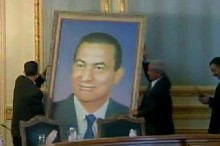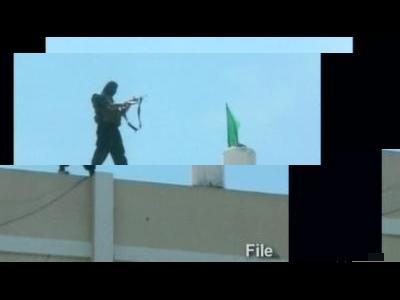 Play Video ABC News – The New Egypt
Play Video ABC News – The New Egypt CAIRO – Egypt's military rulers called for an end to strikes and protests Monday as thousands of state employees, from ambulance drivers to police and transport workers, demonstrated to demand better pay in a growing wave of labor unrest unleashed by the democracy uprising that ousted Hosni Mubarak's regime.
The statement by the ruling military council that took power from Mubarak appeared to be a final warning to protest organizers in labor and professional unions before the army intervenes and imposes an outright ban on gatherings, strikes and sit-ins.
Soldiers cleared out almost all the remaining demonstrators from Cairo's Tahrir Square, the giant traffic circle that was turned into a protest camp headquarters for the 18-day revolt. During more than two weeks of round-the-clock demonstrations at the square, protesters set up tents, brought in blankets, operated medical clinics and festooned the entire plaza with giant banners demanding removal of the regime.
At the height of the uprising, hundreds of thousands packed the downtown crossroads.
Several huge trucks piled high with protesters' blankets left the square Tuesday. All the tents were gone, as were other signs of permanent camps. By early afternoon, a few dozen stalwarts remained, standing in one corner of the square and yelling for the release of political prisoners.
The remaining protesters say they won't leave until all those detained during the revolt are released.
Egypt's ambassador to the United States, Sameh Shoukry, said Mubarak, 82, was "possibly in somewhat of bad health," providing the first word about him since being ousted Friday.
Speaking Monday on NBC's "Today" show, the envoy said he had received the information about Mubarak but could not be more specific. Two Cairo newspapers said Mubarak was refusing to take medication, depressed and repeatedly passing out at his residence in the Red Sea resort of Sharm el-Sheikh. There was no immediate confirmation of the reports.
Mubarak had surgery in Germany last year to remove his gallbladder.
The latest communique by the ruling military council was read on state television by a military spokesman. It said Egypt needed a quieter climate so the military can run the nation's affairs at this "critical stage" and eventually hand over the reins of power to an elected and civilian administration.
The statement also warned that strikes and protests hurt the country's security and economy and gave a chance to what it called "irresponsible parties" to commit "illegal acts." It did not elaborate.
Amid the efforts to build a new system, Egypt's upheaval has splintered into a host of smaller grievances, the inevitable outcome of emboldened citizens feeling free to speak up, most of them for the first time.
Outside the Nile-side TV and state radio building, hundreds of public transportation workers demonstrated to demand better pay. Several hundred protesters from the state Youth and Sports Organization also protested Monday with similar demands in Tahrir after the military had moved the long-term protesters out.
Across the Nile River in the Giza district, hundreds of ambulance drivers demonstrated, also to demand better pay and permanent jobs. They parked at least 70 ambulances on a roadside along the river, but did not block the main road.
In downtown Cairo, hundreds of police demonstrated for a second day for better pay. They also want to clear their reputation, further tarnished by the deadly clashes between protesters and security forces. Some carried portraits of policemen killed in the clashes.
"These are victims of the regime too," declared one placard.
"It's hard for us to go back to work because people hate us," said one protester, a captain who was among the demonstrators. "An official funeral must be held for our martyrs."
Several hundred unemployed archaeology graduates demonstrated outside the Supreme Council for Antiquities in the upscale district of Zamalek, demanding jobs.
Alaa Ashour, head of the country's national carrier, EgyptAir, was removed by the civil aviation minister after workers went on strike at Cairo International Airport. Ashour, also described by airport officials as Mubarak's pilot on international trips, was removed late Sunday after workers called for more perks and pay.
Even so, the protests continued Monday in other subsidiaries of EgyptAir's parent company, as well as workers at companies that provide support services to the airline.
Reflecting the continuing downturn in travel from Egypt, EgyptAir said it had organized only 31 international flights and 12 domestic flights for Monday. The carrier generally has about 145 scheduled flights per day.
The Central Bank of Egypt ordered banks across the country closed following a strike by employees of the National Bank, the largest state bank, and several other financial institutions. Tuesday is a national holiday in Egypt to mark the birth of Islam's 7th century Prophet Muhammad. The banks are scheduled to reopen Wednesday.
The stock market, however, will stay closed Wednesday and Thursday, the final weekday in Egypt. A previous announcement had said it would reopen Wednesday, ending a three-week closure that began after the market lost almost 17 percent of its value in two days of trading in late January.
The ruling military council that took over power from Mubarak on Friday has said that security and a return to normal are among its top priorities. It has urged Egyptians to return to work to save the economy after the 18 days of protests sent hundreds of thousands of foreign tourists fleeing in hurried evacuation flights — a major blow to the country's biggest economic sector.
Monday's protests came a day after the ruling military rulers took sweeping action to dismantle Mubarak's autocratic legacy, dissolving parliament, suspending the constitution and promising elections.
The generals also met Sunday with representatives of the broad-based youth movement that brought down the government. Prominent activist Wael Ghonim posted on a Facebook page he manages notes from the meeting between members of the military council and youth representatives, which he described as encouraging.
The military defended the caretaker government led by Prime Minister Ahmed Shafiq and stocked with Mubarak loyalists as necessary for now in the interests of stability but pledged to change it soon, according to Ghonim and another protester, Amr Salama.
"They said they will go after corrupt people no matter what their position current or previous," the posted statement added. Amendments to the much-reviled constitution will be prepared by an independent committee in the next 10 days and then presented for approval in a popular referendum in two months, they said.
The military also encouraged the youth to consider forming political parties — something very difficult to do under the old system — and pledged to meet with them regularly.
"We felt a sincere desire to protect the gains of the revolution and an unprecedented respect for the right of young Egyptians to express their opinions," Ghonim said.
On Monday, representatives of the youth groups that organized the protests said they wanted Shafiq's government replaced by a cabinet of technocrats and that Mubarak's National Democratic Party be dissolved.
The party has dominated political life in Egypt for three decades and is widely thought to have been behind much of the corruption that protesters have complained about. The party won all but a small fraction of parliament's 518-seat chamber in elections held in November and December that were marred by widespread fraud blamed on the party and its allies in the police and civil service.
The wave of post-Mubarak strikes and protests spread to the community of refugees too.
Several thousand refugees from East African countries, including Ethiopia, Sudan and Somalia, gathered outside the U.N. refugee agency, UNHCR, on the outskirts of Cairo, demanding to be allowed to leave Egypt to resettle elsewhere. Several helmeted riot police officers blocked the entrance, as many in the crowd tried to get into the building. They banged on the gates and threatened to storm the building before they calmed down and representatives went inside to meet with UNHCR officials, who gave them assistance with their daily hardships. There were no clashes and the numbers dwindled to a few hundred by evening.
The refugees complained they have been stuck in Egypt for several years, some as long as a decade. They said the U.N. has made no effort to move them elsewhere, and that they live in difficult conditions in Egypt. The refugees said that with the country in turmoil, there is even greater urgency to move them.
___
Associated Press correspondents Karin Laub and Sarah El Deeb contributed to this report.
http://news.yahoo.com/s/ap/20110214/ap_on_re_mi_ea/ml_egypt




















